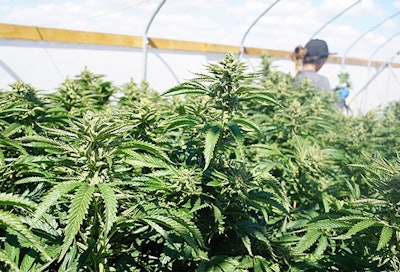
Two months into the adult-use retail cannabis market in California, the growers who laid the foundation of this rapidly expanding industry are beginning to wonder if 2016’s Proposition 64 might be their undoing. Already, state licensing trends show that larger companies will have more than enough room to dominate the marketplace. A lawsuit filed by the California Growers Association (CGA) alleges that state loopholes allow those larger companies to “stack” unlimited numbers of small cultivation licenses next to one another, expanding their reach and boxing out small cultivators.
Because of that and plenty of other concerns, the CGA states in a new report, released this week, that California’s cannabis legalization process is teetering on the edge of “crisis.”
Less than one percent of California farmers have been given proper licensure from the state so far, though it's unclear how many are even interested in applying for a cultivation license. The CGA report works with several tiers of "assumptions," admitting that anywhere form 25 to 75 percent of state growers could be interested in the licensing process. For now, the CGA warns, the implications beyond the current rate are dire.
“This report seeks to inform policy makers in the hopes of solving key problems faced by the regulated community,” the document begins. Released on Feb. 19, the report insists that the new rules (and the costs associated with them) are forcing smaller growers toward the black market. In effect, the stated goals of Proposition 64 are already veering in the opposite direction.
The report quotes a Sonoma County cultivator, who encapsulates the problem: “The unintended consequence of making it so difficult at the local and state level to enter the regulated market is that 80-90% of those who were working with dispensaries prior to 1/1/2018 are being pushed to the black market.
“This is not only bad for the regulated market because so much high-quality produce is now flooding the black market, but crime is increasing as a result as well.
“I am truly heartbroken to see what the regulatory system has done to the artisan cultivators and manufacturers who were creative, diverse, boutique products.
“These people who built this industry are not allowed to participate. I hope we can course-correct this year.”
The CGA posits in this report that “the success of the state regulatory system will be determined by the number of businesses that are able to enter the regulated market.”
As of Feb. 7, only 0.78 percent of California grower applicants had obtained a license, prompting concerns from those who hope to enter the market. (State Sen. McGuire has said that it will take five years to bring 40 to 60 percent of growers into the system.)
According to the report, some 68,150 cannabis growers currently work in the state. Their cultivation operations add up to 258,000 jobs. Those growers produce 15 million pounds of cannabis each year for a state that consumes 3 million pounds annually. This is the central nerve of California’s unique quandary: Where other states “replaced an illicit import-based market with domestic production, … California must transition an existing unregulated marketplace.”
The report insists that it’s not operational inefficiencies that are relegating small growers to the market’s margins; these growers have, broadly speaking, developed sustainable and diverse methods of cultivation and distribution. “Rather, it is the one-time costs of regulations or the inability to comply with regulations because of local land-use policy.”
Since first regulating medical marijuana activity in 2015, the state’s 58 counties have diverged wildly on local cannabis regulations. Already, 25 counties have approved a local ban on commercial cannabis activity “with no clear plan to reconsider the issue,” according to the report. That’s contrasted against 13 counties that have approved ordinances to allow (and regulate) commercial cannabis activity. Even among those 13, the rules vary.
“The systematic risk is that large businesses with more flexibility will locate in a small pool of friendly cities and counties, saturating the regulated California market, while existing small businesses will be left without a path to compliance,” according to the report.
Even when a cannabis grower is positioned in a supportive jurisdiction and interested in regulatory compliance, barriers exist. The report lists several in detail: the prohibition on direct cannabis marketing, the exclusion of growers from state cannabis event licenses, the numerous complications in transportation licenses (and the mandate to base a transportation license on a “separate premises”), a shortage of licensed testing laboratories, the costly distinction between adult-use and medicinal production licenses (a six-month grace period allowing those license to transact with each other will expire in June) and the bureaucratic confusion surrounding the state’s microbusiness license (which would, in theory, allow small growers to vertically integrate on a small scale, in a fashion comparable to a microbrewery). It’s a tangled web, certainly; and while the state is still early in the process of establishing its regulated marketplace, the California Growers Association paints a concerning picture.
“These people who built this industry are not allowed to participate. I hope we can course-correct this year.”
Read the full report here.
With that report as a backdrop, California Growers Association executive director Hezekiah Allen reports this week that he’s monitoring “no less than 99 bills” in the state legislature, all pertaining to cannabis. The subjects of these bills relate to a spectrum of regulatory elements: cultivator sales at events, delivery oversight, hemp cultivar certification, advertisements and much more.
Today, at 9:30 a.m. PST, the California State Assembly will convene a hearing on the roll-out of California cannabis regulations.
Allen invites area growers to join the conversation: “If you are in Sacramento tomorrow please join us after the hearing for lunch and an afternoon reception at The Mix Downtown. We will have guest speakers around 1 PM from our partners at the California Minority Alliance and the Cannabis Distributors Association, as well as a presentation from our policy leadership team. You can RSVP here, or just show up and take care of it at the door. The event is free, but we are asking for a contribution to cover lunch if you have food.”
Otherwise, you can stream the hearing here. Cannabis Business Times will be following along.
Top photo courtesy of Adobe Stock


























